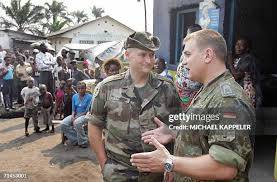### Ivory Coast Says French Troops to Leave West African Nation
In a significant shift in military relations, Ivory Coast has announced that French troops stationed in the country will be withdrawing in the coming months. This decision marks the end of an era of French military presence in West Africa, where the country has maintained a substantial military footprint for decades. Ivory Coast, home to the largest remaining contingent of French troops in the region, is now moving forward with the withdrawal, marking a notable shift in the geopolitical dynamics of the region.
### A Historical Military Presence
French military presence in West Africa has long been a feature of the post-colonial landscape. After gaining independence from France in the 1960s, many former French colonies in Africa, including Ivory Coast, entered into military agreements with France. These agreements allowed French troops to station forces in several countries, ostensibly to protect French nationals, assist in maintaining regional security, and provide counterterrorism support.
In Ivory Coast, French troops have played a prominent role in stabilizing the country during times of political unrest and conflict. In 2002, when the country was plunged into a civil war, French soldiers were deployed as peacekeepers. French forces continued their presence through subsequent years, particularly during the 2010–2011 political crisis, where they played a decisive role in the resolution of the conflict between the government and opposition forces.
At its peak, France maintained over 4,000 soldiers in Ivory Coast, and the country became a central base for French military operations in the region. However, over the years, as regional dynamics shifted and local governments began to emphasize national sovereignty, the French military presence faced growing scrutiny and opposition.
### Why the Withdrawal is Happening Now
The decision to remove French troops comes amid changing political and security landscapes in Ivory Coast and the wider West African region. Several factors have influenced this decision, and the dynamics behind the move reflect the complex relationship between Africa and former colonial powers.
#### **1. Growing Anti-French Sentiment**
In recent years, anti-French sentiment has been growing across West Africa, driven in part by perceptions of French imperialism and its ongoing military involvement in the region. Many African leaders and citizens view the continued presence of French forces as a relic of colonialism that undermines the sovereignty of African nations.
In Ivory Coast, although the relationship between the government and France has largely been cordial, there has been increasing pressure from political factions and civil society groups calling for a reevaluation of the French military’s role in the country. The withdrawal of French troops is seen by many as a response to this growing national sentiment, signaling a desire for more independence in security matters.
#### **2. Regional Security Concerns**
West Africa has become an increasingly volatile region in recent years, with rising threats from militant groups affiliated with Al-Qaeda and ISIS. Countries such as Mali, Burkina Faso, and Niger have been grappling with escalating terrorism and insurgent activity. France’s military operation, known as Operation Barkhane, has been a key part of the counterterrorism effort in the Sahel region, where it has fought against jihadist groups.
However, the effectiveness and longevity of French military operations in the region have been questioned, especially after a string of unsuccessful campaigns and an increasing number of French casualties. As a result, France has started to scale back its presence in countries like Mali, and now Ivory Coast is following suit. The Ivorian government has increasingly emphasized its ability to handle security issues independently, further reinforcing the decision to scale down French involvement.
#### **3. Strengthening Regional Cooperation**
Ivory Coast has been working to enhance regional security collaboration with other West African nations, particularly through the Economic Community of West African States (ECOWAS). As part of this broader initiative, Ivory Coast is keen to bolster its own military capabilities and improve its capacity for self-defense. By removing foreign troops, the government hopes to signal to both its citizens and the international community that it is prepared to take charge of its own security.
Moreover, the Ivorian government has been enhancing its military cooperation with other countries, including the United States and countries within the African Union. This shift represents a broader move away from dependence on former colonial powers like France and toward a more regionally integrated approach to security and stability.
### The Impact on French-Ivorian Relations
The withdrawal of French troops is likely to have a lasting impact on the bilateral relations between Ivory Coast and France. While the two countries have maintained a strong political and economic relationship, particularly in trade and investment, the departure of French military forces could alter the nature of their interactions moving forward.
The decision to pull troops from Ivory Coast could be seen as a broader reflection of France’s recalibration of its role in Africa. The French government has already made moves to reduce its military presence in the Sahel, and the pullout from Ivory Coast may be part of a wider strategy to scale back military engagements on the continent while focusing more on diplomacy, economic development, and regional partnerships.
However, the Ivorian government has made it clear that it values its ongoing diplomatic and economic relationship with France. Despite the military withdrawal, Ivory Coast has expressed a commitment to continuing cooperation in areas like trade, infrastructure, and education.
### Conclusion
The decision for French troops to leave Ivory Coast marks a significant shift in the country’s relationship with France and in the broader geopolitical dynamics of West Africa. While the removal of foreign military presence represents a move toward greater national sovereignty, it also signals a changing approach to regional security and counterterrorism efforts.
The move comes at a time when many African nations are reevaluating their relationships with former colonial powers, striving for greater self-determination and regional collaboration. As Ivory Coast and other nations continue to navigate these complex relationships, the future of West African security will likely depend on the success of regional cooperation and the ability to address the growing security challenges in the Sahel and beyond.
For now, the departure of French forces from Ivory Coast serves as a potent symbol of the shifting tides in Africa’s geopolitical landscape, where national independence and regional cooperation are becoming increasingly central to the continent’s security strategy.




No comments yet
Be the first to share your thoughts!